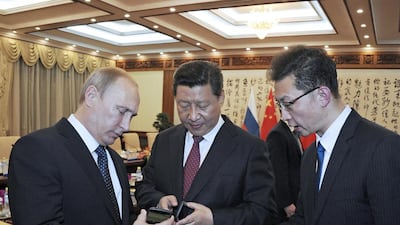The phone that Vladimir Putin gave as a gift to his Chinese counterpart to showcase Russian ingenuity is now available to buy in the UAE.
Yota, the manufacturer, is targeting global sales of one million handsets of the Yotaphone 2 even as Russia’s economy is pounded by the double impact of sliding oil prices and western sanctions. The Russian currency is down almost 40 per cent this year and fell another 0.9 per cent against the dollar as the central bank announced it had spent US$1.9 billion defending the currency last Friday, bringing interventions for the week to $4.5 billion.
The World Bank on Tuesday predicted that Russia’s economy would shrink by 0.7 per cent next year, but warned that the contraction would be worse if oil prices kept sliding.
Mr Putin has championed ambitious deals with non-western partners including Turkey and China to offset its isolation amid tensions over Ukraine.
Last month, Xi Jinping became one of the first owners of the Yotaphone 2 during a meeting with the Russian president at the Asia-Pacific Economic Cooperation (Apec) summit in Beijing.
“The Russian government is looking for opportunity to diversify its economy and it is really happy to see a high-tech company and start-up achieve such good progress. Because of this success, it is not just Mr Putin, but the Russian government that is very proud, that’s why he made a gift to the Chinese president,” said Vlad Martynov, Yota’s chief executive.
Mr Martynov said the current political situation between the US and Russia is unlikely to affect sales of the device in the West once it is launched in the first quarter of next year.
The Android device, dubbed the Russian iPhone and selling here for Dh2,999, includes a “unique” data protection system, developed by Russian engineers and an e-reader on the back, intended to prolong the life of the battery, according to Russia’s state investment fund Rostec, which owns 25 per cent of the company.
“Yotaphone 1 was launched without much expectation in terms of sales, it was more targeted to get the brand name out and to reach out to the early adopters – which they have done,” said Nabila Popal, research manager at IDC Middle East Africa and Turkey. “Since this is a very brand-focused market, they will have to focus more on creating brand awareness to ensure people know it’s not just another cheap ‘Chinese’ phone with a cool feature.”
The new Yotaphone alone is unlikely to make much of a dent in the market here, but the combination of brands like ZTE and Xtouch that are challenging the likes of Apple and Samsung are likely to make an impact, said Ms Popal.
Three-year-old Yota said it had also opened an office in Dubai to serve as its headquarters for the Middle East.
“This market is growing. The reason why we liked this phone [Yotaphone 2] is because it is completely different,” said Vishesh Bhatia, chief executive at local distributor Jumbo Electronics. “There’s nothing like it in the market, it will be niche but the second version proves it works.”
Smartphone penetration in the UAE will rise to almost 84 per cent next year, up from 75 per cent this year. In terms of volume, sales of smartphones are expected to grow by 20 per cent next year, according to figures from IDC.
thamid@thenational.ae
Follow The National's Business section on Twitter

